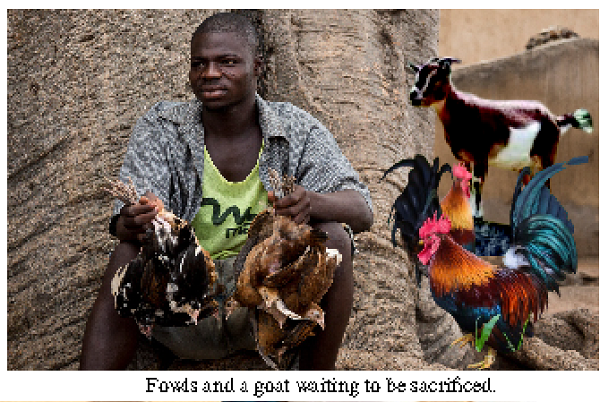
‘When I see the blood’
Grandfather held a cockerel in his hands and told us to squat around stones in the compound. Then, with a sharp knife, he slit the poor bird’s throat, drained the blood on the stones, and threw it down as if he had won a wrestling bout.
Advertisement
“Bring another one,” Grandfather said. Someone took another cockerel from a basket and handed it over to the old man who, with his knife, quickly dispatched this one also.
Five cocks, three hens, and a number of chicks went away that day, with their blood covering the stones. Although he didn’t explain anything to us, we knew that that was another ancestral blood sacrifice of his, which was his favourite ritual.
I was a child of ten years old and harboured too many questions for my age about grandfather addressing his demised ancestors and offering them blood. But I ignored my questions and rather focused on the meat of the slaughtered fowls.
Blood sacrifices
As I grew up, I got to understand two things about blood sacrifices. First, our grandfather’s ancestral blood sacrifices and rituals were part of African and other world’s traditional religions.
Secondly, I believed in Jesus Christ of the Christian faith and understood that what our grandfather used to do with his blood sacrifices was far too late.
It was late because of what God had already done with the blood of his Son Jesus.
God initially accepted blood sacrifices of animals and birds as compensation (or atonement) for the forgiveness of sin. It was indeed an act of mercy for God to accept animal sacrifices in place of punishment for humanity’s wrongdoings.
For example, just before the exodus, God requested the Israelites to mark their homes by smearing animal blood on their doorframes.
“The blood will be a sign for you on the houses where you are,” God told them, “and when I see the blood, I will pass over you. No destructive plague will touch you when I strike Egypt” (Exodus 12:13).
Simply by seeing the animal blood on the doorposts, God would pass over the households of his people and thus save them from destruction.
Temporary measure
The use of animal blood, however, was a temporary measure, a shadow of the ultimate sacrifice to come.
God had already indicated, way back in Genesis, that the seed of the woman would crush the head of the old serpent who caused mankind to sin (Genesis 3:16). That promise was fulfilled when Jesus was crucified, shedding his blood for mankind.
So it was too late for our grandfather to engage in blood sacrifices when Jesus had already been sacrificed as “the Lamb of God who takes away the sin of the world” (John 1:29).
Human beings always want to “help” God. That is why some people still slaughter animals to appease God when there is absolutely no need to do that anymore.
The sacrifice of Jesus rendered every other sacrifice after him null and void. God sacrificed his Son once and for all to atone for our sins in place of the sacrifices of animals and birds that have no souls.
Between the blood of animals and the blood of Jesus who was without sin, I would quickly choose the blood of Jesus. “For it is not possible that the blood of bulls and goats could take
away sins” (Hebrews 10:4).
It was precisely because the blood of goats and sheep could not adequately cleanse us from sin that God used the blood of his only begotten and sinless Son for our salvation.
Price
Have you ever wondered why it says that we have been bought with a price? Bought from whom or from what? God didn’t have to “buy” the Israelites from Pharaoh before saving them from slavery, but he “bought” believers from the grip of Satan and sin so we could be cleansed and made citizens of heaven!
God bought us because sin had sold us to Satan, who held us captives, with eternal death as our penalty for being sinners. Whoever would save or buy us from the grip of sin and Satan must pay that penalty. Jesus paid that penalty.
That is why it says in Revelation 5:9 that with his blood, Jesus purchased persons for God from all nations and peoples. It is because we are bought with a price that we don’t belong to ourselves but are servants of Christ.
Without the shedding of blood, there is no forgiveness of sin—not the blood of animals and fowls, but the precious, sinless blood of Jesus.
Next week: The good Lord willing, when we return to this subject next week, we shall explore the sheer volume of blood Jesus lost from the Garden of Gethsemane to Golgotha.
We will also learn of the power of Jesus’ blood and why Satan and his demons fear this blood.
The writer is a publisher, author, writer-trainer and CEO of Step Publishers.
E-mail: [email protected]




